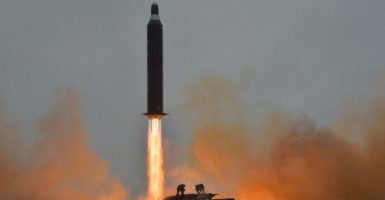In the waning days of his tenure, President Barack Obama is reportedly contemplating declaring a “no first use” pledge for U.S. nuclear weapons.
Such a policy decision, a dramatic reversal of America’s post-World War II security strategy, would be another step toward Obama’s utopian vision of global nuclear disarmament.
U.S. allies rely on America’s extended deterrence guarantee—the triad of U.S. nuclear weapons, ballistic missile defense, and conventional forces—for their security. This reliance prevents opponents from using coercive pressure against U.S. allies, constrains nuclear proliferation, and enables allies to devote their defense budget to conventional forces rather than attempt to duplicate U.S. nuclear forces.
Since 1945, the United States has strengthened deterrence by refusing to adopt a no first use pledge and thereby retaining all possible military options for its own defense and those of its allies. U.S. nuclear weapons can offset opponents’ conventional force superiority and deter them from using other weapons of mass destruction, such as chemical or biological weapons.
The U.K., France, Japan, South Korea, and Germany have all expressed concerns about a no first use declaration. National Security Council spokesman Ned Price stated that the Obama administration is “always looking for additional ways to achieve progress” on Obama’s quest for a “world without nuclear weapons,” announced during a 2009 speech in Prague.
But reality intruded on Obama’s idealism that day when North Korea launched a long-range missile designed to target the United States with nuclear weapons. Since then, Pyongyang has continued to augment its nuclear arsenal and threats to use it against the U.S., South Korea, and Japan.
Implementing a no first use pledge would provoke greater allied insecurity and trepidation of America’s commitment to their defense.
Obama’s May 2016 speech in Hiroshima resurrected his Prague denuclearization vision. By implicitly criticizing the “terrible force unleashed” at Hiroshima and lamenting “how easily we learn to justify violence in the name of some higher cause,” Obama adopted an aloof view disdainful of all violence, lumping aggressors and defenders together. Hiroshima was a tragedy, but so were all the lives lost in the preceding years of conflict.
Implementing a no first use pledge would provoke greater allied insecurity and trepidation of America’s commitment to their defense.
In recent years, allies and partners have expressed unease over U.S. military capabilities brought on by massive cuts to America’s defense budget and have questioned U.S. resolve to counter Syria’s brutal attacks on its populace, Russian and Chinese expansionist behavior, and North Korea’s growing nuclear threat.
A no first use pledge could also lead allies to contemplate developing their own nuclear weapons programs. North Korea’s growing nuclear and missile threat has led South Korean legislators and conservative media to increasingly advocate for an indigenous nuclear weapons program.
South Korean National Assembly member Won Yoo-chul, the floor leader of the ruling Saenuri Party, stated in February, “We can’t borrow [nuclear] umbrellas from next door every time it rains. We should wear a raincoat of our own.”
That a critically important ally is contemplating the necessity of replacing the U.S. nuclear guarantee and several allies have expressed concerns over the ramifications to their security of a U.S. no first use pledge is worrisome. The U.S. should be taking steps to affirm its unwavering commitment to its allies rather than calling it into question.
Editor’s note: A sentence about Adm. Harry Harris and Prime Minister Shinzo Abe has been removed, due to an error.




























